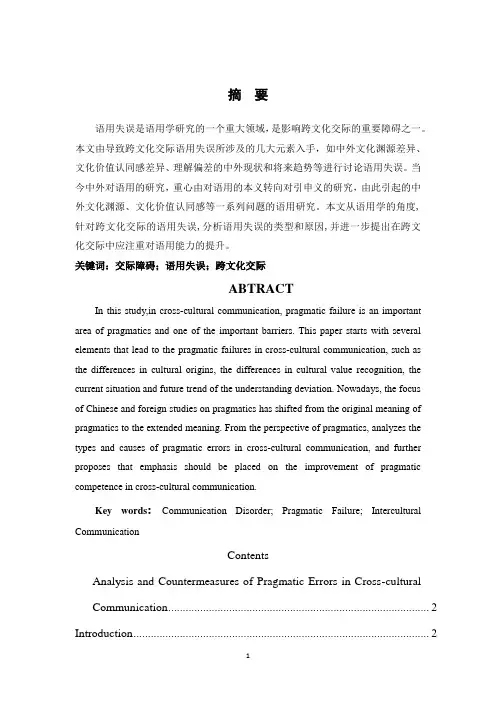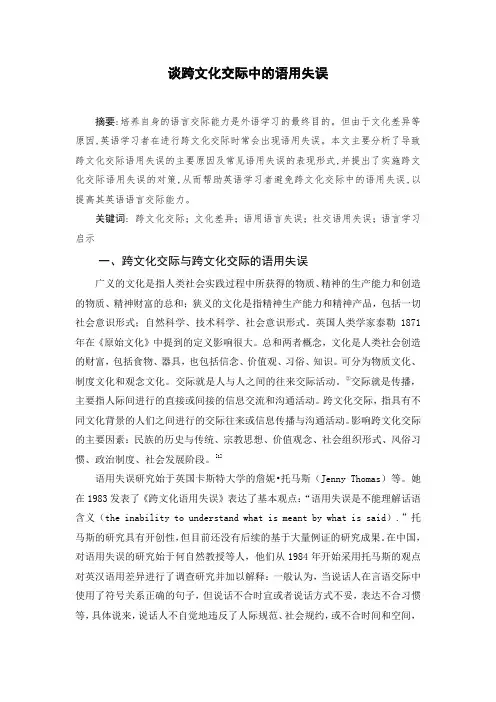跨文化交际中的语用失误分析论文
- 格式:doc
- 大小:96.00 KB
- 文档页数:18

跨文化交际中语用失误的分析和规避方法随着国际交流的日益频繁,跨文化交际作为一门新兴学科,越来越受到人们的关注。
语言学习其实就是语言学习的文化,最终目的是交流。
本文主要讨论了跨文化交际中的语用失误,并分析了语用失误的原因。
一、引言由于不同的历史渊源和社会习俗,不同的国家和民族形成了特定的文化背景,而特定的文化背景又形成了不同的价值观、思维方式、社会规范和语用规则。
这些因素会导致跨文化交际中的交际障碍、交际低效、相互误解以及可能的文化冲突,给交际者带来不必要的麻烦。
掌握基本的语言技能仅仅意味着表达,而真正的交流涉及到很多沟通问题。
交流的目的是让听者理解他们所表达的意思和思想,而不是他们说了什么。
因此,分析跨文化交际中的语用失误具有研究的价值和意义,分析语用失误的原因有助于促进跨文化交际。
二、语言、文化与跨文化交际语言是文化的一部分,语言和文化相互影响、相互作用:要理解语言,就要理解文化,要理解文化,就要理解语言。
由于文化和语言的差异,沟通和交流并不容易,不同文化背景的人在交流中往往会遇到困难。
不同文化背景、不同语言的人在交谈时经常会出现交际失误。
跨文化交际是指本族语者和非本族语者之间的交际;它也指不同语言和文化背景的人之间的交流。
例如,在中国的母语为汉语的人和美国的母语为英语的人的交流中,由于价值观、习俗、思维模式等的差异。
,在交际中何时何地该说什么,不该说什么,对不同的受众说什么,都是交际中应该注意的问题。
三、跨文化交际中语用失误现象在跨文化交际中,如果听话人所感知的话语意义与说话人所要表达的意义不同,这时就产生了语用失误。
jenny thomas把跨文化交际中的语用失误划分为语用语言失误和社会语用失误。
语用语言失误指学习者将本族语对某一词语或结构的语用意义套用在外语上造成的语用失误;社交语用失误指由于文化背景不同而造成的语用错误,涉及到哪些该讲,哪些不该讲,人际关系的远近,人们的权利和义务等,与人们的价值观有关。

跨文化交际中的语用失误和英语教学【摘要】在跨文化交际中,由于交际者之间的文化背景、思维方式、风俗习惯有差异会导致语用失误。
在英语教学中,应注意英汉文化的差异和语用原则,尽量避免在学英语过程中出现的语用失误,从而提高学生的语用能力。
【关键词】语用失误语用能力文化差异英语教学一、引言在教学中,我们常会发现这样的情况:学生具有良好的语法能力、词汇能力、听力能力等,但在目标语的实际运用中总觉得不能运用自如,可以说这是外语学习中长期存在的一个普遍现象。
一方面是因为语用能力不像语言能力中的语法制约那样可进行精确的描写;另一方面,有关语言使用的语用问题高度依赖语境条件,具有多样性、多变性、复杂性。
因此,学习一门语言,仅仅着眼于语言知识的掌握和强调多听多说是不够的。
我们还必须了解与这种语言密切相关的文化诸因素,实际上就是语言的语用规则。
本文通过列举例证,分析了语用失误的原因并探讨解决途径和方法。
二、跨文化的语用失误语言交际中,多数误解的产生不是因为对方听不懂,也不是因为不知道某些词义或句型结构,而是没能理解说话人的意图或推知话语的语境含义。
这说明,交际意图的成功理解是实现成功交际的关键,否则可能出现语用失误或交际失败。
什么是语用失误(pragmatic failure)呢? jerry thomas(1983)在“cross-culturalpragmatic failure”一文中给语用失误下的定义是“the inability to understand what is meant by what is said”(不能通过听到的话语来理解其含义)。
即在任何情况下,只要听话人推知的结果不是说话人所期待的用意或希望传递的交际信息,便可能导致语用失误(thomas,1983)。
语用失误不同于语法错误。
语法错误从语言表层结构就可以看出,受话者很容易发现,常常把这种错误归咎于说话者语言知识的缺乏,因此可以谅解。
语用失误则不然,如果一个能说一口流利外语的人出现语用失误,人们不会把他的失误归咎于其语言能力,而很可能认为他不友好或缺乏教养(thomas,1983:96-97)。

学习任何一门外语,都免不了接触语言相关的文化背景,当然,其中也包含诸如语法、社会等方面知识。
对此,若在实际的运用过程中无法正确理清以上几方面的关系,则在跨文化交流中难免会出现问题。
而这种的问题通常亦将表现出语言用语与社会用语两大方面。
[关键词]跨文化交际语用失误社会用语跨文化的交际过程,掌握语言仅是其一,能可基于不同的语境揣测到对方真正的会话含义,方能尽可能低避免语用失误,进而确保交际过程的顺利。
至于实际交际过程所涉及的相关认知语境,其中则分别包含了文化与思维两方面的要素。
一、跨文化语用失误表现(一)语用语言失误外语学习者,其之所以容易出现语用方面的失误,通常是因未能掌握语言的使用语境,或是依照了自身母语的套用方式来盲目套用了其他语言的表达方式。
1、套用了汉语的表达方式:如当中国售货员以“What do you want?”的方式问及外国顾客,则显然不符合英语习惯。
虽然,外国顾客亦能理解其所指为何意,但这确实是一种极不礼貌的行为,而正确的询问应是“What can I do for you?”2、违法了语言习惯。
如Mother:Jim,have you finished yourhomework?Jim:Yes,I have finished my homework,从此句的语法上来看,看似没有错误,但却违背了英语的表达习惯,并且让提问者认为说话者极不耐烦,故正确的说法应是“Yes,I have,”或“No,Ihaven't,”。
3、混淆相同表达在不同语言中的语用意义。
基于不同的语境,则相同的语言亦可表达不同的含义,如当外来游客问及中国路人“Shall I take this way?”。
若路人回以“Of course,”,雖也表达着当然之意,但却隐约包含不耐烦的情绪。
(二)社交语用失误社会用语上的失误,通常是因双方在社会文化背景方面有所差异而导致,且鉴于交谈双方的身份以及谈话语域的不同亦可能导致双方理解产生歧义。

跨文化交际中的语用失误及其应对策略随着全球化的发展和经济的全球化趋势,跨文化交际已经成为了一个非常重要的话题。
在跨文化交际中,语言是非常重要的工具,而语言中的语用也是一个非常重要的方面。
然而,由于不同的文化背景和语言背景之间的差异,跨文化交际中经常会发生语用失误。
本文将探讨跨文化交际中的语用失误及其应对策略。
一、语用失误的概念语用失误是指在跨文化交际中,由于不同的文化背景和语言背景之间的差异,使用不当的语用规则和习惯而导致的语言行为的不适当或无效。
语用失误可以参照Grice的合作原则进行研究。
合作原则是指在语言交际中,人们都有一个合作的目的,可以通过遵守一些基本原则来达到这个目的。
其中最重要的原则是:说话人应该说出真实的、相关的、明确的、完整的信息,听话人应该理解说话人的意图,不破坏交际双方的合作意愿。
在跨文化交际中,有时人们不知道如何遵守合作原则,就会发生语用失误。
二、语用失误的例子1、称呼和称谓的不当使用在不同的文化中,对于称呼和称谓的使用有着不同的规定。
在中国,我们通常会用称呼加姓氏来表示尊敬。
例如,我们会称呼老师为“张老师”,长辈为“张叔叔”或“张阿姨”。
然而,在西方国家,称呼和称谓的使用是非常严格的。
比如,在美国,称呼老师应该使用“先生”、“女士”或姓氏的缩写,而不是称呼张老师为“张先生”。
如果不知道这些规则,那么就很容易出现语用失误。
2、基于不同文化习俗的礼貌用语的误用礼貌用语在不同的文化中也是有很大的差异的。
在日本,人们通常用“ありがとうございます”表示感谢,而在西方国家,人们则会用“Thank you”表示感谢。
如果在跨文化交际中使用了不当的礼貌用语,就会出现语用失误。
3、基于不同文化习俗的非语言行为的误解在不同的文化中,非语言行为的习俗也是有很大的差异的。
比如,在中国,人们通常会给送别的人手中塞一些东西,以表达祝福和感谢之情。
然而,在西方国家,人们则会用拥抱和亲吻来表示感情。
如果在跨文化交际中,把这些非语言行为的习俗用错了,就会出现语用失误。

浅析跨文化交际语境下的语用失误跨文化交际是指不同国家、不同地域、不同民族之间的交际行为和交际过程。
在全球化的今天,跨文化交际已经成为一种日常生活中不可或缺的一部分。
由于不同文化背景下的语言习惯和交际约定的差异,常常会导致在交际过程中发生语用失误。
语用失误是指在语用过程中违反了某种交际规范或者导致了交际故障的一种言语行为。
本文将就跨文化交际语境下的语用失误进行浅析,探讨如何避免和处理这些失误,以促进跨文化交际的更好开展。
一、文化背景引起的语用失误在不同的文化背景下,人们对待语言的使用和交际方式往往存在着显著的差异。
这样的文化差异极易导致语用失误的发生。
在中国,人们在日常交际中会通过“客气”、“礼貌”的语言表达来传递自己的尊重和友好,而在一些西方国家,过分客气和谦虚反而会被认为是虚伪和不诚实的表现。
所以,当中国人使用过分客气的语言表达时,很容易造成西方人的不适。
类似的情况在各个方面都会存在,比如对待称呼的用词、言语的严谨性、交际的直接性等。
这些文化差异在跨文化交际中容易造成语用失误,而且有时会给交际双方带来尴尬和误解。
二、语言虚构引起的语用失误在跨文化交际中,人们往往会因为对所处语境的不熟悉而造成语用失误。
由于对外语习得的限制,有些人在进行跨文化交际时会使用错误的词语或者语法结构,这样的“语言虚构”往往会导致语用失误的发生。
在中文中,“对不起”是用来表示道歉的词语,但是在英文中,“sorry”并不一定用于道歉,而是可以用来表示遗憾、懊悔等。
有些人在英文交际中过度使用“sorry”,往往会被人认为是不必要的客气。
由于对语法和词汇的掌握不到位,在外语交际中难免会出现语法错误或者词语搭配不当的情况,这也会成为语用失误的来源。
三、非语言交际的失误跨文化交际不仅仅是言语交际,还包括非语言交际行为。
身体语言、肢体动作、面部表情等非语言交际元素在跨文化交际中具有重要的作用,然而由于不同文化对于非语言交际方式的认知和运用也存在着很大的差异,所以往往会导致非语言交际的失误。

浅析跨文化交际语境下的语用失误跨文化交际是指不同文化背景的个体之间进行交流和互动的过程。
在这个过程中,由于各种原因,可能会发生语用失误。
语用失误是指在交际过程中,由于对语言使用规范或文化背景的不了解,导致交际双方之间发生误解或引起尴尬的情况。
本文将就跨文化交际语境下的语用失误进行浅析。
语言的表达方式在不同的文化中可能存在差异,这就容易导致跨文化交际中的语用失误。
在西方文化中,直接表达个人意见被视为一种自由和诚实的表现,而在东方文化中,过分直接表达个人意见可能被认为是不尊重他人或破坏社会和谐的行为。
当西方人以他们习惯的直接方式表达意见时,东方人可能会感到冒犯或受伤。
这种情况下,西方人并不是故意冒犯,而是由于不了解东方文化的习惯而发生了语用失误。
语言中的隐含意义和非语言暗示在不同文化中也可能存在差异,这也会导致跨文化交际中的语用失误。
在英语中,“你看起来很疲惫”可能被理解为对对方的关心和关怀,而在某些东方文化中,这样的说法可能被视为对对方外貌的负面评价。
当一个英语母语者用这样的话来安慰一个东方文化的人时,很可能引起对方的误解和困惑。
文化习俗和社会礼仪的差异也会导致跨文化交际中的语用失误。
在一些西方文化中,直接询问对方的年龄、婚姻状况或收入等个人隐私问题是不礼貌和不尊重的。
而在一些东方文化中,这样的问询被看作是对对方关心和尊重的表现。
当两个文化背景不同的人进行交流时,如果不了解对方文化中的这种差异,就很容易发生语用失误。
跨文化交际中的语用失误还可能涉及到言语的禁忌话题。
不同文化中存在着一些被视为敏感或禁忌的话题,例如宗教、政治、性别等。
在交流中触及这些话题可能会导致不愉快甚至冲突。
在跨文化交际中,我们需要避免触碰这些敏感话题,以免引起误解或争议。
跨文化交际语境下的语用失误是由于不同文化背景带来的语言和文化差异导致的。
要减少这种失误,我们需要增加对不同文化背景的了解和尊重,提高对不同文化习俗和社会礼仪的敏感度,避免使用可能引起误解或困惑的表达方式,并避免触碰敏感话题。

摘要语用失误是语用学研究的一个重大领域,是影响跨文化交际的重要障碍之一。
本文由导致跨文化交际语用失误所涉及的几大元素入手,如中外文化渊源差异、文化价值认同感差异、理解偏差的中外现状和将来趋势等进行讨论语用失误。
当今中外对语用的研究,重心由对语用的本义转向对引申义的研究,由此引起的中外文化渊源、文化价值认同感等一系列问题的语用研究。
本文从语用学的角度,针对跨文化交际的语用失误,分析语用失误的类型和原因,并进一步提出在跨文化交际中应注重对语用能力的提升。
关键词:交际障碍;语用失误;跨文化交际ABTRACTIn this study,in cross-cultural communication, pragmatic failure is an important area of pragmatics and one of the important barriers. This paper starts with several elements that lead to the pragmatic failures in cross-cultural communication, such as the differences in cultural origins, the differences in cultural value recognition, the current situation and future trend of the understanding deviation. Nowadays, the focusof Chinese and foreign studies on pragmatics has shifted from the original meaning of pragmatics to the extended meaning. From the perspective of pragmatics, analyzes the types and causes of pragmatic errors in cross-cultural communication, and further proposes that emphasis should be placed on the improvement of pragmatic competence in cross-cultural communication.Key words: Communication Disorder; Pragmatic Failure; Intercultural CommunicationContentsAnalysis and Countermeasures of Pragmatic Errors in Cross-cultural Communication (2)Introduction (2)Chapter I (7)Theoretical Basis (7)1.1.Theoretical Basis (7)2.1. Language pragmatic failure (8)2.2Social pragmatic failure (10)2.3. Non-verbal pragmatic failure (13)Chapter III (16)The cause analysis of pragmatic failure and strategies for Pragmatic Failures in Cross-cultural Communication (16)Conclusion (19)The solution study of Pragmatic Failures in Cross-cultural Communication (19)IntroductionPragmatic errors caused by the differences of various elements in cross-cultural communication have become a serious problem. Due to the fact that each country does not understand the cultural characteristics of native English speakers and non-native speakers, and there are differences in their beliefs, cultural value recognition and understanding, pragmatic errors occur in cross-cultural communication. Therefore, it is increasingly important to study pragmatic errors in cross-cultural communication. Expression in communication, use of vocabulary, sentence and culture value identity subtle difference also can cause communication barriers, in cross-cultural communication, we are no longer simply to express literal meaning, must be combined with the other person's social status, cultural background and environment, through a series of accurate analysis, the correct expression and understanding the true meaning of the speaker. Based on this theory, the study of pragmatics focuses on the cultural value recognition and understanding. With the development of linguistics, pragmatic errors have gradually become a hot topic among scholars. Languages have been formed for thousands of years, and their statusis not easily shaken. However, due to various cultural backgrounds, they all have fixed language structure and logical thinking. Pragmatics scholars believe that in communication, even if the speaker USES the correct and standard grammar, the deviation of the way of expression and the neglect of the cultural background and social rules can lead to communication barriers, which leads to pragmatic failure.Nowadays many scholars found the original meaning and metaphorical meaning of the study of foreign language that focus on both sides of the subject and the culture origin of differences, as well as the difference between Chinese and foreign cultural value identity understanding deviation, for us to study of pragmatic failure in cross-cultural communication pointed out the direction. However, their research is only limited to the description on the surface of language and does not focus on pragmatic errors. Now, on the basis of Jenny Thomas' classification, scholars classify pragmatic errors into pragmatic language errors and social pragmatic errors. In cross-cultural communication, the verbal expression fails to achieve the desired effect of the target language, or the structure of the mother tongue is created, and inappropriate verbal expression leads to misunderstanding and communication barriers. Social pragmatic error refers to the pragmatic error caused by the misunderstanding of the cultural background of the other party in communication. The pragmatic failures in cross-cultural communication can be analyzed from their respective beliefs, cultural value identity and understanding. Some differences between English-speaking countries and Chinese in these aspects. English-speaking countries pay great attention to the pursuit and sublimation of personal values, especially the protection of personal privacy. Therefore, it can be known that in the communication of English speaking countries, such as marriage status, children, actual age, salary, religion, etc., are private and are forbidden to be asked. However, in China, tolerance is great, and people pay attention to the harmony and friendship between people and all things in the world. So the Chinese are more collectivist. In addition, English-speaking countries also have different time control. English-speaking countries more unknown's vision of the time, but the Chinese culture under the edification of the Chinese pay more attention to the history ofexploration, in the history of Chinese pay more attention to hierarchical, and junior to his birthright, and the English-speaking countries pay attention to equality, it also makes people to say in communication, taboo language and euphemism and politeness language is different. In the long run, the differences in understanding of language habits lead to pragmatic errors and hinder the smooth progress of communication.However, according to the cross-cultural pragmatic failures redefined in this thesis, the cross-cultural pragmatic failures should be divided into three categories: pragmatic, social and nonverbal pragmatic failures. The former two belong to the verbal level and the latter to the non-verbal auxiliary level. It provides a new perspective for further analysis and countermeasures of pragmatic errors in cross-cultural communication.People living in a common society are bound to abide by social rules. Social rules are norms that regulate people's behavior in society, including cultural background, cultural value identity, religious belief and other factors. There is an old saying: "no rules, no radius." Social rule is a constraint mechanism to regulate society, and it is a criterion to regulate social behavior that can be recognized by the whole society gradually formed by people in the society in the long-term historical background. In other words, without the existence of social rules, all social activities and social existence are difficult to unify activities. We violate social rules, according to the degree of violation, will be punished by the world, both social criticism, punishment, even legal sanctions. People have to follow certain social rules and follow them naturally.As an important part of society, speech is bound to be subject to certain social rules.Just as people's expression must follow social rules, people's speech expression must follow the rules of usage Shared and created by society, that is, the rules of social language. Social language rules belong to the category of social rules in cross-cultural communication. Just as it is natural for people to follow the social norms, the verbal expression is also the observance of the rules of social language, as well as the recognition of cultural value naturally generated after they understand the cultural background of various countries and communicate with thelanguage rules of various countries. As there are differences in social rules, there must be differences in social language rules, which leads to differences in cross-cultural communication. Due to the influence of many factors, the differences become more and more severe, which will be disastrous if it is ignored in the context of today's globalization. We tend to only pay attention to the learning of grammatical structures and ignore the understanding of logical thinking and cultural background. Between different cultures is not only reflected in the pragmatic language failure refers to the pragmatic meaning in the context of a particular language make communication both sides understand the deviation caused by error, specific as phonetics, vocabulary, grammar mistakes of words, but also in social pragmatic failure and even pragmatic failures in cross-cultural nonverbal communication in auxiliary language, body posture, object object language, etc., including communication, communication, communication error. It is urgent to study pragmatic failure.People of different cultures in communication often understanding deviation or not meet expectations, such as their don't know the culture of native English speakers and between non-native characteristic, follow each other beliefs, cultural values, identity and understand the differences between the differences with the social language rules caused by lacking of awareness of cross-cultural communication breakdown, linguists called pragmatic failures.And with these words with science research community in order to smooth progress of communication all over the world, has started the study of pragmatics, and the term "pragmatic failure" began in the British linguist Jenny Thomas (1983), and the pragmatic failure into linguistic pragmatic failure and social pragmatic failure, points out that "as long as the perception by the speaker's discourse with the speaker intends to express or think should be obedient people perceived meaning is different, then creates a" pragmatic failures. He Ziran(1997) believes that "pragmatic failure is not the linguistic failure in general diction and sentence construction, but the failure in speaking out of turn, or the improper way of speaking or expression out of habit.The existing definition of Thomas and He Ziran only studies the verbal errors and ignores the importance of non-verbal AIDS. Verbal expression accounts for about one-third of verbal communication, and the remaining two-thirds is done with nonverbal assistance. Therefore, the existing pragmatic errors should be redefined as: in cross-cultural communication, one of the communicating parties is called pragmatic errors because of the misunderstanding caused by the verbal and non-verbal AIDS. Pragmatic failures can be divided into pragmatic and social pragmatic failures. Language pragmatic failure lies only in the language itself, the native language speakers live move hard stretched out the form structure, in the desire to express the meaning but not the pragmatic failures caused by clear of her intention, is due to express the original meaning of language and word meaning understanding deviation caused, often characterized by semantics, grammar, structure, expression of pragmatic failure, this also caused the social pragmatic failures. However, according to the cross-cultural pragmatic failures redefined in this paper, the cross-cultural pragmatic failures should be divided into three categories: pragmatic, social and nonverbal pragmatic failures. The former two belong to the verbal level and the latter to the non-verbal auxiliary level. It provides a new perspective for further analysis of Chinese students' misunderstanding in cross-cultural communication ,This thesis mainly adopts the literature research method to study the views of scholars on pragmatic errors.Taking pragmatic failures as the focus of pragmatics research, scholars' research shows that the study of language culture learning and background is no longer just the study of language learning, but the study of the ultimate purpose of pragmatic failures and the development direction of pragmatic failures. By means of discussion and practical verification, linguists have shown how to reasonably express their own words so that both sides can achieve the desired effect. By analyzing the understanding deviation caused by pragmatic failure, linguists have analyzed the relationship between discourse communication and cultural background. Different cultural backgrounds lead to different communication modes. There are also studies on language strategies that affect cross-cultural communication errors, and show howhuman verbal communication develops and what factors restrict human communication, which plays a very important role in our study of pragmatic errors.The first chapter introduces the background and current situation of the research, the purpose and significance of the research, the research methods and the structure of the paper.The second chapter introduces relevant theoretical research and theoretical basis.The third chapter introduces the types of pragmatic failures,The fourth chapter analyzes the causes of pragmatic failures, The fifth chapter summarizes the pragmatic failures.Chapter ITheoretical Basis1.1.Theoretical BasisThomas and definition of pragmatic failure, this article studies verbal pragmatic failures, the British linguist Jenny Thomas (1983) for further study of pragmatic failures, and the pragmatic failures can be divided into linguistic pragmatic failure and social pragmatic failure and points out that the speaker of words do not tally with the anticipated effect to make each other understand deviation cause pragmatic failure. He Ziran (1997) holds that pragmatic errors are not only linguistic errors, but also improper expression errors. However, the importance of non-verbal assistance has been gradually valued by the broad masses, which is defined as: one party of the two sides of communication is called pragmatic failure because of the misunderstanding of the other party caused by verbal expression and non-verbal assistance. Pragmatic failures can be divided into pragmatic and social pragmatic failures. Languagepragmatic failure lies only in the language itself, the native language speakers live move hard stretched out the form structure, in the desire to express the meaning but not the pragmatic failures caused by clear of her intention, is due to express the original meaning of language and word meaning understanding deviation caused, often characterized by semantics, grammar, structure, expression of pragmatic failure, this also caused the social pragmatic failures.Chapter II2.Main Types of Pragmatic Errors in Cross-culturalCommunication2.1. Language pragmatic failurePragmatic language failure refers to the errors caused by the misunderstanding of the pragmatic meaning of language in a specific context, which include errors in pronunciation, vocabulary and grammar. Due to the subtle influence of the native culture and the factors of their own learning ability, when learning English pronunciation, they will have an accent, ignore consonants, wrong pronunciations, wrong vowels, and ambiguous stressed syllables, resulting in phonetic errors. V ocabulary is caused by the influence of Chinese language structure which leads to the deviation of English meaning comprehension and the improper use of similar words. Grammar is caused by the confusion of tense and voice in communication. For example, Chinese students and foreign students live together in the dormitory. In themiddle of the night, Chinese students play music. The Chinese students answered, "It's 1 o 'clock at night." obviously, the Chinese students did not understand that the foreign students' specific question meant that they should have gone to sleep quietly instead of listening to music recklessly. Therefore, we must pay attention to the appropriateness of language in language communication. Pragmatic linguistic errors are mainly considered from the perspective of communicative parties.First of all, it is taken for granted that the other side can fully understand their own words, and the improper way of expression leads to pragmatic failure, such as the conversation between English speakers and Chinese.Chinese: Has Marry been set free?English speaker:What happened to her?Here the problem is a typical Chinese style of question sentence structure, and if the Chinese mean free this is Mary, general meaning come to Mary for me to play, but the English country people will think Mary accident of imprisonment its consequences, so in the appropriate context of discourse to combine their cultural background and sentence comprehensive analysis to ensure the smooth progress of communication.Again, such asEnglish speaker: Thank you.Chinese: It is my duty to do It.This is a conversation in which the Chinese accompany the English speakers to the exhibition, the English speakers express their thanks, and the Chinese reciprocate. Thank you for your company. Although the polite response of Chinese people is quite different from the normal humble response in Chinese culture, due to the cultural background of the two sides, the semantics in the speech are quite different. However, according to the normal understanding of the guests, the correct answer should be "It is my pleasure. Because English-speaking people think of "duty" as a greater responsibility and psychological burden is too heavy, contrary to social norms and other meanings, which will be uncomfortable and cause communication barriers.2.2Social pragmatic failureThe social pragmatic failure is that different cultural backgrounds have different views on the appropriate language behavior in a specific context. As a result, English-speaking countries and Chinese people misunderstand the real meaning of their words in the complex social culture, resulting in communication barriers. For example, according to Chinese traditional virtues, respecting the old and caring for the young is a virtue beyond reproach to Chinese students. Anglophone elders, however, see the attention given to her as a sign of old age and distemper, causing difficulties in communication. Differences in cultural background and cultural values lead to this social pragmatic failure. People from different cultural backgrounds may have a wrong understanding of inappropriate speech patterns. Behaviors that are generally accepted in one culture are not recognized or even discarded in another culture. What is appropriate and appropriate to express in one culture is considered naive and ignorant in another culture. These ubiquitous differences in the sense of value identity lead to communication difficulties and obstacles between English-speaking countries and Chinese people. Learners of English are influenced by the logical thinking of their mother tongue in language expression and use English according to the structure of their mother tongue. This deep-rooted cultural atmosphere interferes with our learning of English, which we call negative cultural transfer. The greater the cultural differences between English-speaking countries and Chinese, the greater the negative cultural transfer gap, and the higher the failure rate of pragmatic mistakes. Some typical examples of negative cultural transfer in the failure of social pragmatics, which is one of the important reasons for the failure of cross-cultural communication.Cultural background differences lead to social pragmatic errors in greeting, personal, euphemism, polite language and taboo words.Social pragmatic failures of greeting and person.For exampleA student greets an English-speaking teacher with "Hello ,the teacher John."This kind of pragmatic mistake is a typical mistake in English and Chinese modes. In English countries, we should use Sir, Madam, Mr, Mrs, Miss, Ms and theirsurnames to address each other. We can't use personal occupation as the address. Chinese call teacher Li, doctor Lin, manager Wu and so on. It can be seen that the differences in cultural backgrounds lead to the failure of communication everywhere. There are also privacy issues that English speakers refuse to answer and loathe.And privacy protections for English speakers cannot be ignored."Older?" "From where? "How many people in the family?""what is your occupation?" "how much is your salary?"And so on. Although the Chinese are not willing to answer, but the Chinese will polite polite response, English speakers will directly refuse or even reduce contact. This protection of privacy is also due to cultural differences.The social pragmatic failure of polite language, polite language can make you grasp the right time in communication and praise the other party appropriately to make the communication go smoothly, polite language in the conversation from time to time to use polite words transition dialogue, so that the conversation goes on smoothly. Pragmatic rules are relatively existing and common among countries, but the most important thing is to understand the cultural background of both sides and to restore the appropriateness of language to the greatest extent. Different language structures have similarities and great differences in details, which require the joint efforts of both sides in communication to grasp the similarities of conversation as far as possible to common communication, so that the two sides can communicate smoothly. The two sides of the communication with different cultural backgrounds grasp the use and flexibility of pragmatic rules, and measure the communicative standards and forms of expression.An English-speaking student goes to a Chinese student's home for dinner and says "I can eat all of this food" to show his satisfaction with the food, but the Chinese student thinks there is not enough food for him! If Chinese people invite friends from English-speaking countries to dinner, they always say humbly, "there is no good food to serve, please excuse me until you arrive, please help yourself!" People in English-speaking countries think, "since you invited me to dinner, shouldn't you treat me well? Wouldn't it be better to have a good reception?" It can be seen that theunderstanding of table manners is also very deviated, and the social pragmatics mistakes are not properly grasped, which leads to the departure of the party.Social pragmatic failure of taboo words and euphemism. Taboo words and euphemism are mutually complementary and closely attached to each other. Since there are some taboos, euphemism should be used to avoid them to ensure smooth communication. Taboo words and euphemisms exist in most languages, which are the product of the long-term formation of the society. However, euphemisms are relatively generated from this, enabling people to follow the principle of politeness in their lives, and thus language has broad commonality. In English-speaking countries of "old" euphemism is particularly, mapping in English-speaking countries people taboo "old" social mentality, old man most single life had come to the English countries, sad lonely, so the "old" is a taboo, resulting in English-speaking countries, known as "senior citizens" elderly (an senior citizen), it is stray flower defeated , but euphemistically called hale and hearty. Chinese people more grief, Chinese culture is not to "old" is the taboo, national tradition also has the traditional culture of "respect", the old man most has children to take care of, in the home is "the home has a old if there is a treasure" of say, universal respect and care for, old "in the Chinese culture far from a daunting word, instead it gives a person the sense with a kind of" respected ". People like to use "old" to show respect, love, respect, such as "you old, old gentleman, old cadres, old revolutionary old professor" and so on, these are the title of respect for the elderly, it seems friendly. But this is forbidden in English-speaking cultures. English speakers don't usually call people "old" to their faces, so how old are you? Although it may seem polite, the other person will not like it, because he may think you are laughing at his lack of usefulness. At the same time of language learning, communicative competence is reflected not only in the correctness of the grammatical structure of language, but also in the appropriateness of social pragmatic language.The aim of language learning is to cultivate students with language communication, and the cultivation of communicative ability and cultural background of learning and teaching have a close relationship, when learning a language, if simply learning language syntax and does not include the culture background, not tounderstand the social rules of the language, and cannot accurately, in communication. Let the students enhance their awareness of the culture of English-speaking countries, subtly, improve the understanding of the culture of English-speaking countries, cultivate the sense of cultural value and correct cultural perception.There are a lot of social pragmatic errors in cross-cultural communication, so it is particularly important to study social pragmatic errors, which not only helps to reduce pragmatic errors in cross-cultural communication, but also promotes the effective conduct of cross-cultural communication. Through a concrete analysis of the various manifestations of the study of social pragmatic errors, we can explore the underlying historical causes such as historical formation, cultural values and sense of identity. To understand and analyze the culture of English-speaking countries and improve the understanding of different cultures is also an effective way to reduce social pragmatic errors in communication.For exampleIn China, people may ask one another, "how old are you?What kind of work do you do ?And how much does it pay? "And so on.In the context of China's extensive and profound culture is an appropriate speech act, popular and cordial. But in foreign countries where English is the native language, they pay special attention to privacy protection and inviolability, which will lead to antipathy, and they will directly refuse to answer, thus causing communication barriers.2.3. Non-verbal pragmatic failurePragmatic failures in cross-cultural non-verbal communication are embodied in auxiliary language, body posture and object language and other aspects, including communicative behavior, communicative mode, communicative situation mistakes. Nonverbal communication is to assist and create the right atmosphere so that the speaker can express the meaning of the conversation more accurately. Facial expression is the main expression of communication, while smile is the leading part ofexpression. In the same social situation, people from different cultures have different understandings of smile. For example, if people in English-speaking countries hear the other side of the joke during the meal habit of whispering, low-key and elegant continue to eat. Chinese people, however, laugh and share jokes with those around them to create a harmonious atmosphere. People in English-speaking countries, however, believe that they interfere with other people's normal eating and cause communication problems. For example, when a person makes a mistake, he/she reflects on himself/herself with an expression of guilt and self-reproach, while making a humble and careful apology in his/her tone. In this way, he/she can express his/her guilt in a coherent auxiliary language and express his/her attitude and body with an expression that makes people feel that they are worthy to be taught.Gestures reinforce confidence and courage in the words they are trying to express.For exampleThe speaker say, "we can only succeed in this way."At the same time, the others with their heads up, their bodies straight, their drummers, and their enthusiasm, express their firm ideals and beliefs.Object including gestures, eye, face, expression, atmosphere, etc., can play in the appropriate atmosphere using the appropriate expression make communication smoothly, for example: conversation, people use gestures, eye, posture, and pause tone hint at his words, transition, emphasizing the importance of making words can make each other understand more. It can be seen from this that if we ignore the assistance of non-verbal communication, it will replace the adjustment, emphasis and cooperation of verbal communication. In verbal communication, you will complete the sentences in accordance with the grammatical structure with fear, but in interpersonal communication, you will violate or be unfamiliar with the cultural background of the other party, and the use of inappropriate auxiliary language in an inappropriate atmosphere will still hinder the smooth communication.There is also a big difference in the expression of eyes between English-speaking countries and Chinese people in communication. Chinese people do。

浅析跨文化交际语境下的语用失误在全球化的背景下,跨文化交际成为了一种常见的交际方式。
由于不同文化背景的差异,跨文化交际中常常出现语用失误。
语用失误指的是在交际中,由于对对方文化和语言使用规范的不了解而产生的交际失败情况。
本文将从跨文化交际的语言和文化差异、语用失误的常见类型以及避免语用失误的方法等方面进行浅析。
跨文化交际的语言和文化差异是导致语用失误的主要原因之一。
不同文化之间存在着语言表达方式的差异,即语言习惯和用词习惯的差异。
中国文化对于谦虚和彬彬有礼的言辞较为重视,而西方国家则更注重直接和强调个人权益的表达方式。
如果一位西方人在与中国人交流中过于直接和强调个人权益,可能会被认为是无礼和不尊重对方。
语言的使用也会受到文化背景的影响。
中国文化注重团结合作,常使用“我们”来表示整个团体的意思,而西方文化更强调个人主义,更倾向于使用“我”来表达个人的意见和行为。
如果在交际中使用了错误的语言习惯或用词习惯,就容易造成语用失误。
语用失误的常见类型包括面子文化上的失误、礼貌用语的失误以及非语言行为的失误。
在跨文化交际中,面子文化尤为重要。
面子是指个体或集体在社会交往中维护自己的尊严、尊重和形象的需求。
在东方文化中,面子文化是十分重要的,为了维护对方的面子,会选择不直接回答或掩饰真实感受。
而在西方文化中,个人自由和直接表达更加重要。
当东方人拒绝西方人的请求时,可能会用委婉的方式表达,而西方人可能会感到困惑。
礼貌用语是一种随着文化背景的差异而存在的语言差异。
在中国文化中,当你被邀请去朋友家做客时,通常会礼貌地回答“不好意思,麻烦您了”,而在英语中,对于邀请,回答一般会用“Yes, I would love to”或者“No, thank you”来表示。
非语言行为也是产生语用失误的因素之一。
不同文化对于肢体语言、面部表情和目光交流等的解读方式会有所不同。
一个手势、一个微笑或者一个注视都可能在不同文化中传递出不同的含义,如果不能正确解读对方的非语言行为,就可能造成语用失误。

跨文化交际中的语用失误分析与对策跨文化交际中的语用失误分析与对策在全球化的今天,跨文化交际已经成为一种非常普遍的沟通方式。
然而,由于不同语言和文化背景的差异,跨文化交际中经常会出现语用失误,给沟通双方带来一定的困扰和不便。
本文将从语用失误的定义与类型、分析原因和对策等多个方面来探讨跨文化交际中的语用失误。
一、语用失误的定义与类型语用失误指在跨文化交际中,由于使用者对目标语言的语用规则不熟悉,导致与原语言所表达的含义不同的信息传达过程。
语用失误的类型分为四类:(1)错用语用规则;(2)选择不当的语用策略;(3)未恰当运用常用语;(4)意图不明确。
其中,错用语用规则指的是在无意识的情况下,使用者将自己母语的语用规则错误地应用到目标语言中。
比如,很多英语学生在学习中文的时候,会不自觉地采用英语中的“尊重性语言”来表达敬意和礼貌,这往往会在中国人的眼中显得过于生硬和冷淡。
选择不当的语用策略是指使用者在跨文化交际中选择不适当的语用策略导致了沟通不畅。
比如,在西方国家中,使用直接的语言表达对方的错误或不满是非常常见的,但在华人社会中,这种做法会被认为是不礼貌和失礼的。
未恰当运用常用语是指使用者在跨文化交际中,未能恰当地运用目标语中常见的语言和表达方式,导致信息传达不清楚。
比如,日本人在主动表达自己的意见时,通常会使用含糊不清的表达方式,这容易让他们的外国朋友误解他们的意思。
最后,意图不明确是指在跨文化交际中,无法准确地表达自己的意图,从而造成语用失误。
比如,一些母语非英语的学生在申请留学时,由于无法准确表达自己的想法和意愿,导致申请被拒或错过最佳的申请时间。
二、分析语用失误的原因产生语用失误的原因主要有两大方面:一是文化差异;二是语言差异。
由于不同的文化背景和价值观,不同的人群对于同一事物可能有截然不同的看法和态度。
比如,在中国,长辈和上司通常被视为更加重要和值得尊重的人物,而在西方,个人的权利和自由则更受到重视。

谈跨文化交际中的语用失误摘要:培养自身的语言交际能力是外语学习的最终目的。
但由于文化差异等原因,英语学习者在进行跨文化交际时常会出现语用失误。
本文主要分析了导致跨文化交际语用失误的主要原因及常见语用失误的表现形式,并提出了实施跨文化交际语用失误的对策,从而帮助英语学习者避免跨文化交际中的语用失误,以提高其英语语言交际能力。
关键词: 跨文化交际;文化差异;语用语言失误;社交语用失误;语言学习启示一、跨文化交际与跨文化交际的语用失误广义的文化是指人类社会实践过程中所获得的物质、精神的生产能力和创造的物质、精神财富的总和;狭义的文化是指精神生产能力和精神产品,包括一切社会意识形式;自然科学、技术科学、社会意识形式。
英国人类学家泰勒1871年在《原始文化》中提到的定义影响很大。
总和两者概念,文化是人类社会创造的财富,包括食物、器具,也包括信念、价值观、习俗、知识。
可分为物质文化、制度文化和观念文化。
交际就是人与人之间的往来交际活动。
②交际就是传播,主要指人际间进行的直接或间接的信息交流和沟通活动。
跨文化交际,指具有不同文化背景的人们之间进行的交际往来或信息传播与沟通活动。
影响跨文化交际的主要因素:民族的历史与传统、宗教思想、价值观念、社会组织形式、风俗习惯、政治制度、社会发展阶段。
[1]语用失误研究始于英国卡斯特大学的詹妮•托马斯(Jenny Thomas)等。
她在1983发表了《跨文化语用失误》表达了基本观点:“语用失误是不能理解话语含义(the inability to understand what is meant by what is said).”托马斯的研究具有开创性,但目前还没有后续的基于大量例证的研究成果。
在中国,对语用失误的研究始于何自然教授等人,他们从1984年开始采用托马斯的观点对英汉语用差异进行了调查研究并加以解释:一般认为,当说话人在言语交际中使用了符号关系正确的句子,但说话不合时宜或者说话方式不妥,表达不合习惯等,具体说来,说话人不自觉地违反了人际规范、社会规约,或不合时间和空间,不看对象,不顾交际双方的身份、地位、场合等,违背目的语特有的文化价值观念,使交际行为中断或失败,使语言交际遇到障碍,导致交际不能取得预期效果或达到完满的交际效果,这种性质的失误就叫做语用失误。

日英中跨文化交际中的语用失误分析[摘要]商务外语是一门特殊用途语体,主要用于跨文化间的商务交流。
然而,商务外语的应用并非简单的懂外语或懂商务知识,对不同国家文化背景的了解在很大程度上影响着商务谈判和合作的进行。
交际双方由于忽略语言本身的文化内涵会引起各方面的语用失误。
本文试图在分析汉日英三国跨文化交际中的语用失误现象的基础上,探讨造成跨文化交际中语用失误的原因并提出了避免跨文化语用失误的一些建议。
[关键词]汉语日语英语跨文化交际语用失误随着全球经济一体化不断推进,国际商贸往来日益频繁。
因此,我国需要大量既谙熟商务领域专业知识同时又具备较强交际能力的复合型人才。
在经济全球化的今天,商务外语教学的最终目的是要培养懂国际商务规则、掌握世界各民族文化特点的复合型人才,而能否跨越文化障碍、避免文化冲突,是国际商务活动能否顺利开展的关键。
一、何谓语用失误语言学习者在使用目的语与目的话国家的人士进行交谈的过程中,由于对语言与非语言环境、谈话双方的关系、谈话主题以及双方共有的背景知识等缺乏一定的了解,常常会造成误解或谈话的中断,致使交际失败而达不到预期的效果。
对于这一类跨文化交际中出现的故障,人们称之为语用失误。
更确切的一个定义则是来自英国的语言学家珍妮·托马斯(1983):失误是对言词背后隐含意义的理解能力的缺乏。
大体说来,语用失误的原因可以分为两种;其一通常是由于外语学习者使用的目的语不符合本族语人的语言习惯而使他们在交际中错误地套用母语的表达方式;其二则是不了解或忽视会话双方的社会、文化背景差异(洪岗,1995)。
根据托马斯的理解,语用失误被划分为两类:语用语言失误(pragmalinguistic failure)与社交语用失误(sociopragmatic failure)。
语用语言失误基本上是一个语言的问题,具体表现在表达不合语种的语言习惯,误用表达式或是不懂语言的正确表达式,而按母语的语义或结构套用。
交际语用失误文化论文:解读交际语用失误的文化成因语言与社会和文化有着密切的关系,语言的使用离不开作为社会和文化成员的人以及使用语言的环境。
语言研究的重点也逐渐从语言系统进而到语言的功能,从纯语言形式进而到在实际情境中使用的语言形式。
跨语言、跨文化的语用现象涉及两种语言和两种文化对交际的影响。
不同文化背景的人在一起用某种语言进行交际,总回避不了语用差异,而这种语用差异往往是他们的文化差异造成的。
这些差异会对交际造成影响,出现信息误导、信息错误和信息障碍,这就是所谓语用失误。
语用失误的概念是由英国语言学家Jenny Thomas(1983)提出的,他认为语用失误是“无法理解所说话的意思”,属于“跨文化交际故障范畴”。
如果交际一方出现语用失误,交际的另一方就可能产生误解,以致影响交际的顺利进行。
所以,我们使用英语时,除了具备英语语言本身的知识(语音、语法、词汇)和技巧外,还要认识汉、英两种语言在语用中的文化因素及由此而产生的文化差异。
这里举一个实际的例子。
有一位从美国来上海教英语的女教师,听到人民公园有一个“EnglishCorner”,便去那里观光一番。
回来后有人问她观感如何,她面带不悦之色回答说,我好像去了一次海关或警察局,因为他们老是问我“What is your name?How old are you?How many children do you have?What does your husband do?How much do you earnin China?”等一系列问题。
这些问题在语法上都是正确的,但问题的内容及话题的选择涉及到英美人的隐私,违反了他们的说话原则,使他们误解中国人爱干涉他人的私事,认为在中国他们的行动处处受到别人的监视,严重时会造成文化休克。
因此,外语教学不仅仅是语言教学,而且应该包括文化教学,这一点已逐渐成为人们的共识。
美国外语教学协会在其提出的外语能力要求中,已经列入交际能力的内容,交际能力包括五个方面,即四种语言能力(听、说、读、写)和文化素养(社会文化能力)。
跨文化交际中的语用失误分析跨文化交际中的语用失误是指在与其他文化背景的人交流时,由于对目标文化的语用规则不熟悉或理解有偏差,而产生的交际失误。
语用失误可能导致误会、冲突甚至伤害他人感情,因此在跨文化交际中,理解和避免语用失误是至关重要的。
首先,语用失误往往源于对目标文化的语境、礼貌、直接与间接表达等方面的不了解。
在不同文化中,对同一词语或行为的理解可能不同,而导致误解。
例如,在一些东方文化中,直接表达负面情绪被视为失礼,而在西方文化中,直接表达情绪被视为坦诚。
因此,如果一个西方人直接向东方人表达不满,可能会被认为是冒犯或不尊重他人。
其次,语言中的隐含意义也常常引发语用失误。
对于一些文化来说,表达其中一种意思时,使用的措辞可能并不直接。
例如,在英语中,有时通过间接方式来表示请求可以被视为礼貌的行为。
然而,对于一些非英语母语的人来说,可能会将其理解为拒绝或不愿意。
因此,在跨文化交际中,理解并学会使用非直接的表达方式非常重要。
再次,文化价值观的差异也可能导致语用失误。
在不同的文化中,对于一些行为、观点和话题的看法可能不同。
例如,在一些文化中,谈论个人财务状况被视为不恰当的话题,而在另一些文化中,这可能是可以接受的。
因此,在与其他文化背景的人交流时,需要注意避免触及可能敏感的话题,以免造成误解或冲突。
最后,语言差异也可能导致语用失误。
不同的语言可能有不同的词法、句法和语法规则,因此,直接将一种语言的表达方式翻译成另一种语言可能会失去原本的意义或引发误解。
在跨文化交际中,对于语言差异的认识和理解是必要的,以避免产生语义或语用误解。
为了避免语用失误,有一些具体的建议可以参考。
首先,跨文化交际双方应尽量了解对方的文化和语用规则,包括礼貌用语、直接与间接表达和文化敏感的话题等。
其次,保持开放和尊重,理解对方可能有不同的看法和行为习惯。
再次,对于可能存在的语言差异,最好直接与对方沟通并解释自己的意图,以确保双方的理解一致。
38跨文化交际中的语用失误分析■陈 培/西安交通工程学院摘 要:在跨文化交际中,语用失误是比较常见的现象。
导致语用失误的因素有很多,其中母语负迁移是造成语用失误的一大诱因,而语用失误又会造成交际的失败,因此,研究母语负迁移和语用失误就很有必要。
本文从语用负迁移的角度对跨文化交际中出现的语用失误进行探究,并提出了一些避免语用失误的对策,以期提高外语学习者的跨文化交际水平。
关键词:语用失误 语用负迁移 跨文化交际一、语用失误和语用负迁移语用失误的概念是由Jenny Thomas 于1983年提出的。
Thomas 指出,“只要听话人所感知的话语意义与说话人意欲表达的或认为应该为听话人所感知的意义不同,这时就产生了语用失误”。
语用失误被分为语用语言失误和社交语用失误两种。
前者是指由于受到母语的干扰,或者套用母语的结构等而导致的违反语言使用习惯的失误,后者是指因为双方生活习惯不同或文化差异等而造成的语言表达上的失误。
迁移是指语言学习者在学习新知识时,将自己以前所掌握的经验用在新知识的学习和掌握上的一种过程。
作为迁移中一个比较常见的现象,语用迁移指的是“外语使用者在用目的语时,由于受到母语及其文化影响,而套用母语中语用规则的现象”,有正迁移和负迁移两种,这其中负迁移是造成语用失误的一个重要因素。
在跨文化交际中,语用失误特别普遍,下面将从语用负迁移方面对语用失误的现象进行分析。
二、语用负迁移造成的语用失误(一)称呼语中的语用失误称呼语在言语交际中具有十分重要的地位,因此,采用恰当合适的称呼在跨文化交际中是十分有必要的。
自古以来,中国人都讲究辈分分明,长幼有序,注重称呼里的等级。
例如,在家中,晚辈不能直呼长辈的名字,否则会被认为是不尊重长辈;在日常生活中,学生不能直接称呼老师的姓名,对比自己大的邻居也不能直呼其名,对社会地位比自己高的人,更不能直呼其名,通常是在对方姓后面加上职务来显示对其的尊敬,如“程主任”、“王总”等。
论跨文化交际中的语用失误与语用移情能力的培养论文【关键词】语用失误语用移情跨文化交际【论文摘要】语用失误有语言语用失误和社交语用失误两种表现形式。
注重语言本身,而忽略了不同语言文化差异是造成语用失误的主要原因。
因此,在跨文化交际中要成功消除语用失误所造成的障碍.必须了解目的语语言文化,调整自己的思维定势,做到语用移情。
文章分析了跨文化交际语用失误的种类和原因,并且对在外语教学中如何培养学生语用能力和语用移情的习惯提出了一些切实可行的看法和建议。
一、引言对于跨文化交际中的语用失误,国内许多知名学者如何自然,何兆熊以及其他许多学者都做了很多研究,并且发表了许多相关文章,取得了可喜的成果。
这些研究有的侧重广告翻译、社会用语、旅游英语等不同交际领域的语用失误,如郝钦海(2000),张新红(2000),陆建平(20O1),赵湘(2006)等;有些侧重研究称呼语、褒奖行为等具体的言语行为中的语用失误,如李悦娥(1998),刘小珊(0o1)等。
然而他们的研究对于语用失误的原因分析过多,而对于如何解决语用失误的办法研究不够。
本文结合非本族语者使用英语的实际情况,分析了语用失误的种类及其根源,并指出培养语用移情能力是解决跨文化交际语用失误的重要途径,同时对如何培养学生的语用移情能力提出了一些切实可行的办法。
二、语用失误1983年Thomas在他的论文“Pragmaitcfailureincrossculturaleommunicali’中提出了“语用失误”的概念,引起了国内众多学者的注意和兴趣。
Thomas认为所谓语用失误是指人们在言语交际中没有达到完满交际效果的差错。
“语用失误”这一概念的提出为跨文化研究提供了新的视角。
我们可以说,某人说了一句不符合语法规则的话,并称其为“语法错误”,因为语法是规定好了的规则(至少是为了语言教学的目的已经规定好了的)。
可是,我们却不能说某句话的语用之力是“错误的”。
我们只能说这句话没有达到说话人想要达到的目的。
浅析跨文化交际语境下的语用失误在全球化的今天,跨文化交际已经成为了常态。
人们在工作、生活中经常需要和来自不同文化背景的人进行交流。
跨文化交际也常常伴随着语用失误,这种失误有时会导致误解甚至冲突。
了解跨文化交际语境下的语用失误及其原因是非常重要的。
本文将从跨文化交际的语用失误现象入手,分析其原因,并提出一些避免语用失误的建议。
我们需要了解什么是语用失误。
语用失误是指在语言使用过程中,由于文化差异、语言习惯等原因而造成的交际失败或者不当的语言使用现象。
在跨文化交际中,语用失误往往表现为语言交流中的误解、不当的表达、不合适的语气等。
这种失误可能是由于语言结构、语用规则、习惯用语等方面的差异导致的。
在跨文化交际语境下,最常见的语用失误包括使用不当的称谓、使用不当的语气、不恰当的幽默、隐喻和比喻的误用等。
举个例子,中国人在和外国人交流时往往容易使用称谓“小伙子”、“阿姨”、“叔叔”等,这些称谓在中国文化中很常见,但在其他文化中可能会被视为不礼貌,甚至有伤风化。
又在英语中,讽刺幽默是一种常见的交际方式,但在一些文化中可能会被误解为侮辱。
这些都是由于文化差异造成的语用失误。
那么,跨文化交际语用失误的原因是什么呢?跨文化交际语境下的语用失误往往源自于文化差异。
不同文化中的人们对于称谓、语气、幽默、隐喻等的理解和运用都可能有所不同,导致了语用失误的发生。
语言的多义性和模糊性也是跨文化交际语用失误的原因之一。
同一个词在不同文化中可能有不同的含义,甚至相同的词在不同语境中也可能会产生误解。
个人对于语言的理解和运用也有着差异,有些人可能缺乏语用规则的意识,导致了语用失误的发生。
针对跨文化交际语用失误,我们可以提出一些避免失误的建议。
需要尊重对方文化的差异,尽量避免使用可能被视为不礼貌或者冒犯的表达和称谓。
需要注意语境,避免在不恰当的场合使用幽默、讽刺等。
需要注重语用规则的学习和意识培养,了解对方文化中的语言习惯和用法,尽量避免误用。
浅析跨文化交际语境下的语用失误跨文化交际是指不同文化之间进行交流和互动的过程。
在这个过程中,语言和文化之间的差异会导致语用失误的产生。
语用失误是指在跨文化交际中,由于对语境和文化背景的不理解而导致的交际不成功或产生误解的情况。
本文将浅析几种常见的跨文化交际语用失误,并提供一些解决方案。
第一种语用失误是指通过语言中的词语或表达方式传递了错误的信息或产生了误解。
举例来说,某个国家的人在与外国人交流时,可能会使用自己的习惯用语或俚语,而这些用语在其他国家可能会被理解为侮辱性的言辞。
为了避免这种语用失误,人们需要学习和了解目标文化的语言和表达方式,避免使用可能会引起误解的词语或表达方式。
第二种语用失误是指使用错误的非语言语言(非言语)导致交际不成功。
非言语包括面部表情、姿势、身体动作和空间关系等。
不同文化对非言语的解读方式不同,如果不了解目标文化的非言语语境,就有可能产生误解。
举例来说,在某些国家,直接看别人的眼睛可能被视为无礼或挑衅的行为,而在其他国家则被视为礼貌和尊重的表达方式。
要避免这种语用失误,人们需要学习并适应目标文化的非言语语境,避免不恰当的非言语行为。
第三种语用失误是指对文化背景和社会习俗的不了解所导致的交际问题。
每个文化都有自己的价值观和行为规范,如果不了解这些规范,在跨文化交际中就容易出现问题。
举例来说,在某些文化中,直接表示拒绝可能被视为失礼,而在其他文化中,直接表达自己的意见被视为诚实和坦率。
为了避免这种语用失误,人们需要学习和了解目标文化的价值观和行为规范,尊重对方的文化差异,避免产生误解。
解决跨文化交际中的语用失误需要多方面的努力。
个人需要有一定的跨文化敏感性和意识,意识到自己的语言和行为可能会受到文化差异的影响。
学习和了解对方的文化背景和语用规范是非常重要的。
这可以通过与当地人交流、阅读相关资料和参加跨文化培训来实现。
灵活性和适应性也是解决语用失误的关键要素。
人们应该尝试适应目标文化的语境,并及时纠正自己的语言和行为,以避免产生误解。
本科生毕业论文(设计) 题 目 The Enlightenment of Critical Period Hypothesis on Children’s English Teaching 姓 名 学号 院 系 外国语学院 专 业 英语 指导教师 职称 年 月 日 ii
ACKNOWLEDGEMENTS I am deeply indebted to my supervisor, who has given me constant and valuable advice, read my drafts through meticulously and offered incisive comments on them. Without her help, the thesis could never have reached its present form. My sincere gratitude also goes to all my teachers who have given me excellent lectures and great help, which are indispensable to the completion of this thesis. I also give my hearty thanks to all my classmates who have offered generous help and useful suggestions in the process of writing this thesis. Finally, I would like to express my appreciation to all the writers whose works have been referred to in this thesis. iii
摘 要
随着社会和经济的发展,国际之间的合作与交流不断深入,跨文化交际语用失误已成为语用学和应用语言学研究的一个重要领域。本文从语用学和跨文化交际角度出发,首先回顾了语用学的定义以及跨文化交际和语用学的关系,并且对语用失误概念进行界定和归类;然后,从中西语言和文化差异、语用负迁移、思维方式和言语行为差异、语用原则、分析了跨文化语用失误的原因;最后,通过分析现实生活中出现的语用失误现象,提出在跨文化交际中如何避免语用失误及其对外语教学的启示;总结得出外语教学应该通过文化意识的培养、传统教学理念和教学方法的改革,培养和提高学习者的语用能力和跨文化交际能力。
关键词:跨文化交际;语用失误;语用能力;交际能力;外语教学 iv
Abstract With the development of society and economy, the communication cooperation between nations becomes more and more frequent. Pragmatic failure has been one of the heated topics in the field of pragmatics and applied linguistics. From the view of pragmatics and cross-cultural communication, the thesis firstly reviews the definitions of pragmatics and the relationship between pragmatics and intercultural communication. Then, pragmatic failure is defined and classified. At the same time, I probe into the causes of the pragmatic failure from the following aspects as: language and culture differences, negative pragmatic transfer, different thinking patterns and speech behavior, pragmatic principles. Through analyzing many phenomena of pragmatic failures collected from the real life, the thesis finally puts forwards some practical suggestions and implications for foreign language teaching, arriving at the conclusion that foreign language teaching should concentrate on improving the students' intercultural communicative competence and pragmatic competence through the cultivation of students' cultural awareness, reformation of traditional teaching concepts and methods.
Key words: intercultural communication, pragmatic failure, pragmatic competence, communicative competence, EFL teaching and learning v
CONTENTS 0. Introduction .............................................................................................................. 1 1. Literature Review .................................................................................................... 2 1.1 Definition of Pragmatics .......................................................................................... 2 1.2 Language and Culture .............................................................................................. 2
2. Analysis of Pragmatic Failure in Intercultural Communication ......................... 3 2.1 Definition of Pragmatic Failure ............................................................................... 3 2.2 Classifications of Pragmatic Failure ........................................................................ 4
3. Causes of Pragmatic Failure ................................................................................... 6 3.1 Differences in Culture Context ................................................................................ 6 3.2 Negative Pragmatic Transfer.................................................................................... 7 3.3 Differences in Pragmatic Principles ......................................................................... 7
4. Implications for Teaching and Learning ................................................................ 8 4.1 Cultivation of Student's Cultural Awareness ............................................................ 9 4.2 Reformation of Traditional Teaching Concepts and Methods ............................... 10
5. Conclusion .............................................................................................................. 11 Works Cited ................................................................................................................ 13